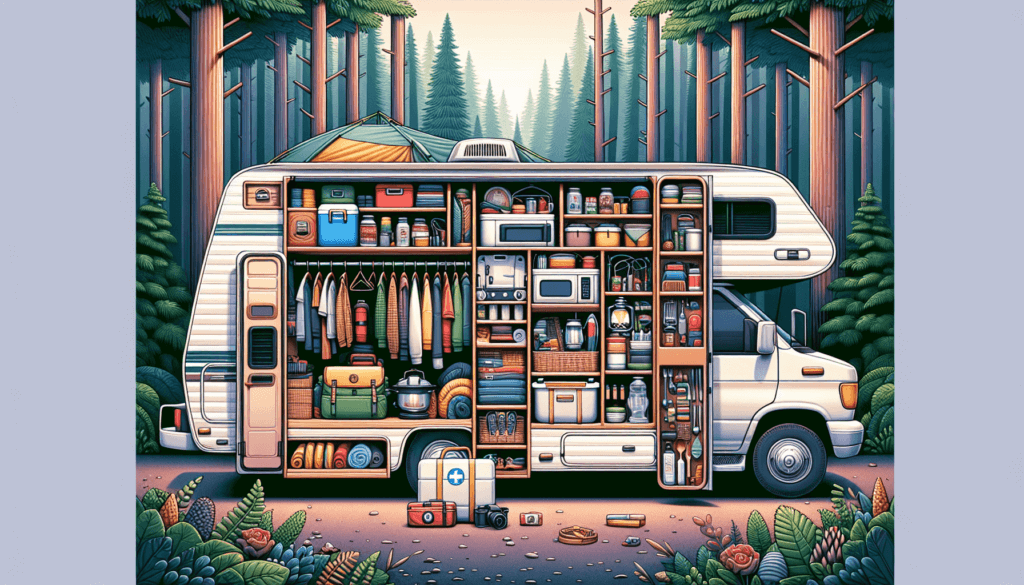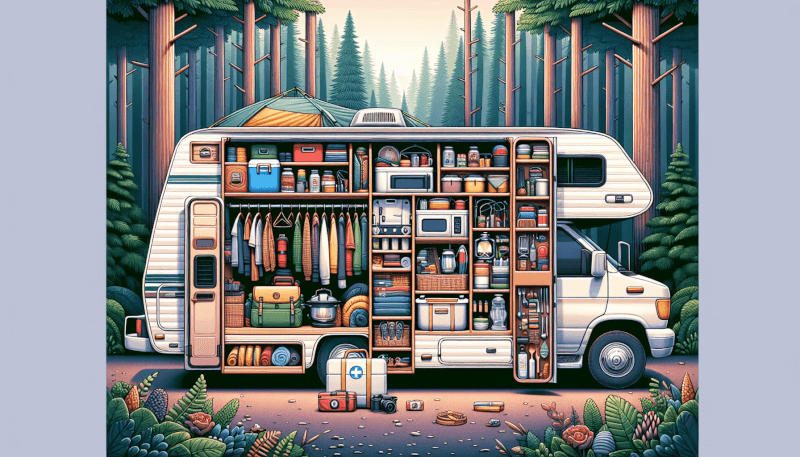Are you ready for an unforgettable RV camping adventure? Look no further! This article provides you with the ultimate RV camping checklist that will ensure you don’t forget any essential items for your trip. From camping gear and cooking essentials to toiletries and safety supplies, we’ve got you covered. With this comprehensive checklist in hand, you can confidently hit the road and embark on an amazing journey filled with relaxation, exploration, and countless memories. So, pack your bags and get ready to immerse yourself in the beauty of nature as you enjoy the freedom and comfort of RV camping.
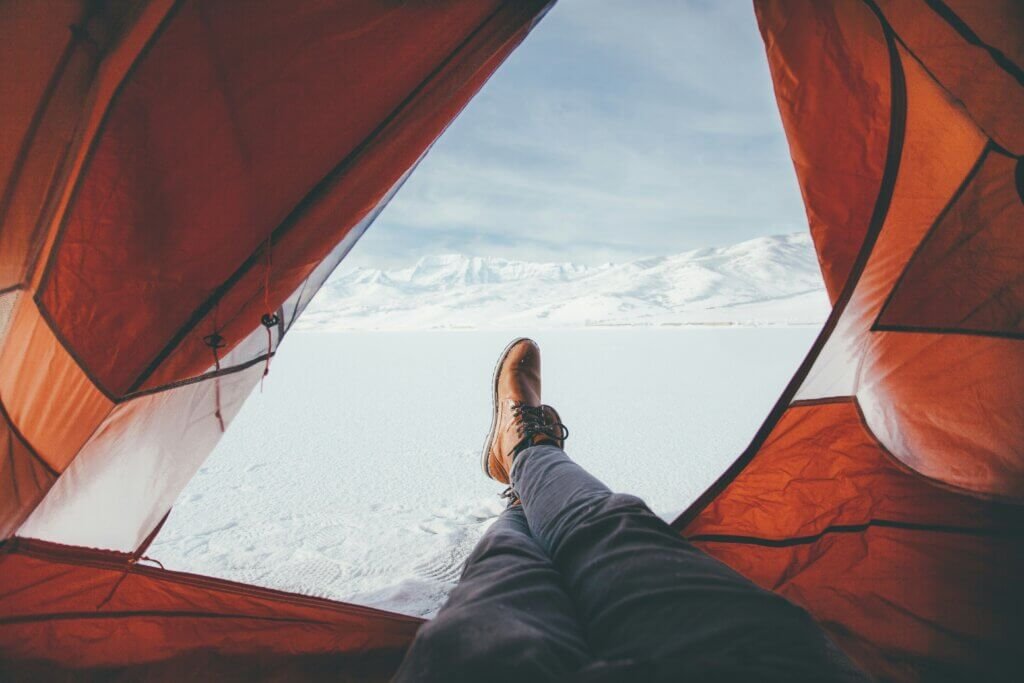
Essentials
RV Keys
Before hitting the road, make sure you have your RV keys handy. It may seem obvious, but forgetting your keys can quickly turn your camping trip into a frustrating ordeal. Double-check that you have them before leaving and keep them in a safe and easily accessible place throughout your journey.
Driver’s License and Registration
Don’t forget to bring your driver’s license and RV registration. These documents are not only necessary for legal purposes but also important in case you encounter any traffic stops or accidents along the way. Keep them safe and within reach at all times.
Proof of Insurance
In addition to your license and registration, it’s essential to carry proof of insurance for your RV. This will serve as protection in case of any unforeseen circumstances or accidents. Make sure you have a copy of your insurance policy readily available in case you need it.
First Aid Kit
Safety should always be a top priority, especially when you’re venturing out into nature. A well-stocked first aid kit is essential for any camping trip. Pack bandages, antiseptic ointment, pain relievers, insect repellent, and any necessary prescription medications. It’s better to be prepared for minor injuries or illnesses than to be caught off guard.
Emergency Roadside Kit
Even the most well-maintained RV can sometimes experience mechanical issues. That’s why it’s crucial to have an emergency roadside kit on hand. This kit should include items such as a flashlight, jumper cables, tire pressure gauge, basic tools, and a reflective warning triangle. With these essentials, you’ll be better equipped to handle any unexpected breakdowns.
Tool Kit
Having a basic tool kit can come in handy for minor repairs or adjustments during your camping trip. Include items like a hammer, screwdrivers, wrenches, duct tape, and zip ties. These simple tools can save the day in case something breaks or needs fixing.
RV Manual
Every RV is unique, and it’s important to familiarize yourself with your specific model. Bring along the RV manual, which will provide valuable information about the operation, maintenance, and troubleshooting of your vehicle. It can be a lifesaver when trying to troubleshoot technical issues.
Road Maps or GPS
While modern technology has made navigation easier than ever, it’s always smart to have a backup plan. Bring along road maps or a GPS device to ensure you can find your way, even if you lose signal or encounter unexpected detours. Having these tools at your disposal will give you peace of mind and prevent unnecessary stress.
Campsite Reservations
Before embarking on your RV camping adventure, make sure you have confirmed reservations at your desired campsites. Many popular campgrounds fill up quickly, especially during peak seasons. By making reservations in advance, you can secure your spot and avoid disappointment upon arrival.
Clothing and Personal Items
Weather-Appropriate Clothing
When packing for a camping trip, it’s crucial to consider the weather conditions at your destination. Pack clothing suitable for the forecasted temperatures and weather patterns. This may include t-shirts, shorts, and hats for warm weather or sweaters, jackets, and gloves for cooler climates. Layering is key to accommodate changing conditions.
Pajamas
Don’t forget to pack comfortable pajamas for a good night’s sleep. Opt for breathable fabrics that are suitable for the expected temperatures in your camping location.
Swimsuits
If your camping trip includes any water activities, don’t forget to pack swimsuits. Whether it’s a dip in the lake or a swim in the RV park’s pool, having swimsuits on hand ensures you can take full advantage of any aquatic fun.
Hiking Boots or Sturdy Shoes
Exploring the great outdoors often involves hiking and walking on uneven terrain. Make sure to pack sturdy footwear such as hiking boots or comfortable sneakers to keep your feet protected and supported. This way, you can fully enjoy the wonders of nature without worrying about blisters or discomfort.
Rain Gear
Nature is unpredictable, which means rain showers can occur unexpectedly. To stay dry and comfortable, pack rain gear such as waterproof jackets, pants, and umbrellas. This will allow you to continue enjoying your outdoor activities without getting soaked.
Hats and Sunglasses
Protecting yourself from the sun’s rays is crucial, especially during extended periods of outdoor activities. Don’t forget to pack hats and sunglasses to shield your face and eyes from harmful UV rays. Choose wide-brimmed hats for maximum sun protection.
Toiletries
Pack all your necessary toiletries, such as toothbrushes, toothpaste, shampoo, soap, and any other personal care items you use daily. Remember to bring items specific to your needs, such as contact lenses, glasses, or any other personal hygiene products.
Towels
Bring an ample supply of towels for bathing, swimming, and any other water-related activities. Quick-drying microfiber towels are a great option as they take up less space and dry faster than traditional towels.
Bedding
Ensure a good night’s sleep by packing bedding that suits your comfort preferences. This may include sheets, blankets, pillows, and even a cozy sleeping bag if you prefer that camping experience.
Laundry Bag
Keep your dirty clothes organized by packing a laundry bag. This will make it easy to separate dirty laundry from clean items and will prevent odors or messes in the RV.
Kitchen Supplies
Cooking Utensils
When it comes to cooking in the great outdoors, having the right utensils is essential. Pack items such as spatulas, tongs, cooking spoons, and a whisk to make meal preparation a breeze. Don’t forget a can opener and bottle opener for easy access to canned and bottled goods.
Pots and Pans
To cook your favorite meals while camping, bring along a set of pots and pans. Consider the sizes and types that best suit your cooking needs. A non-stick frying pan is especially handy for easy cleanup.
Plates, Bowls, and Silverware
Eating meals while camping requires durable and lightweight plates, bowls, and silverware. Look for options specifically designed for outdoor use, as they are usually more resistant to breakage and easier to pack.
Cups and Mugs
No camping trip would be complete without a hot cup of coffee or a refreshing beverage. Don’t forget to pack your favorite cups and mugs for enjoying your favorite drinks.
Cutting Board and Knives
Preparing meals on the go often requires chopping and slicing ingredients. Pack a cutting board and a set of sharp knives to make meal preparation efficient and safe.
Can Opener
Many camping meals involve canned goods, so don’t forget to pack a reliable can opener. This simple tool can save the day when hunger strikes.
Measuring Cups and Spoons
If you enjoy cooking with precision, packing a set of measuring cups and spoons is a must. This way, you can follow recipes accurately and ensure consistent flavors in your meals.
Food Storage Containers
Proper food storage is essential to keep your provisions organized, fresh, and secure from critters. Pack a variety of food storage containers in different sizes to accommodate leftovers and prevent spoilage.
Aluminum Foil and Plastic Wrap
Aluminum foil and plastic wrap are versatile essentials for cooking and storing food while camping. They can be used to wrap leftovers, make packets for grilling, or create makeshift covers for bowls and dishes.
Trash Bags
Responsible camping includes proper waste disposal. Pack an adequate supply of sturdy garbage bags to keep your campsite clean and to dispose of trash in designated receptacles.
Food and Drinks
Non-Perishable Food Items
Having a supply of non-perishable food items is essential for any camping trip. These items don’t require refrigeration and can be safely stored for an extended period. Some examples include canned goods, dried fruits, nuts, granola bars, and ready-to-eat meals.
Bottled Water
Staying hydrated is crucial, especially when engaging in outdoor activities. Pack enough bottled water to last throughout your camping trip. Consider bringing a few extra gallons for cooking and cleaning purposes as well.
Snacks
Between meals, it’s always nice to have snacks on hand. Pack a variety of your favorite snacks such as chips, crackers, trail mix, or energy bars. These will keep hunger at bay and provide quick and convenient energy boosts.
Coffee or Tea
If you’re a coffee or tea enthusiast, don’t forget to pack your preferred brew. Whether you opt for ground coffee and a French press or tea bags, having your favorite hot beverage will enhance your camping experience.
Condiments and Spices
To add flavor to your camp-cooked meals, bring along your favorite condiments and spices. Pack essentials like salt, pepper, oil, vinegar, ketchup, and mustard in small containers to save space.
Cooking Oil
Having a small bottle of cooking oil is essential for cooking and grilling. Consider packing a convenient squeeze bottle or a small travel-size container.
Paper Towels
Paper towels are a practical necessity for cleaning up spills and messes in the RV kitchen. They’re also handy for serving as makeshift napkins or even as disposable plates in certain situations.
Dish Soap
Ensure cleanliness by packing dish soap specifically designed for camping. It’s effective in cutting through grease and hygiene-friendly, making cleanup a breeze.
Garbage Bags
In addition to the garbage bags mentioned earlier, don’t forget to pack smaller bags for your day-to-day trash disposal needs. Having these on hand will help you maintain a tidy and organized RV.
Cooler or Refrigerator
If your RV doesn’t have a built-in refrigerator, consider bringing a cooler to keep perishable items fresh. Using ice or freezer packs, a cooler can help preserve your food and prevent spoilage.
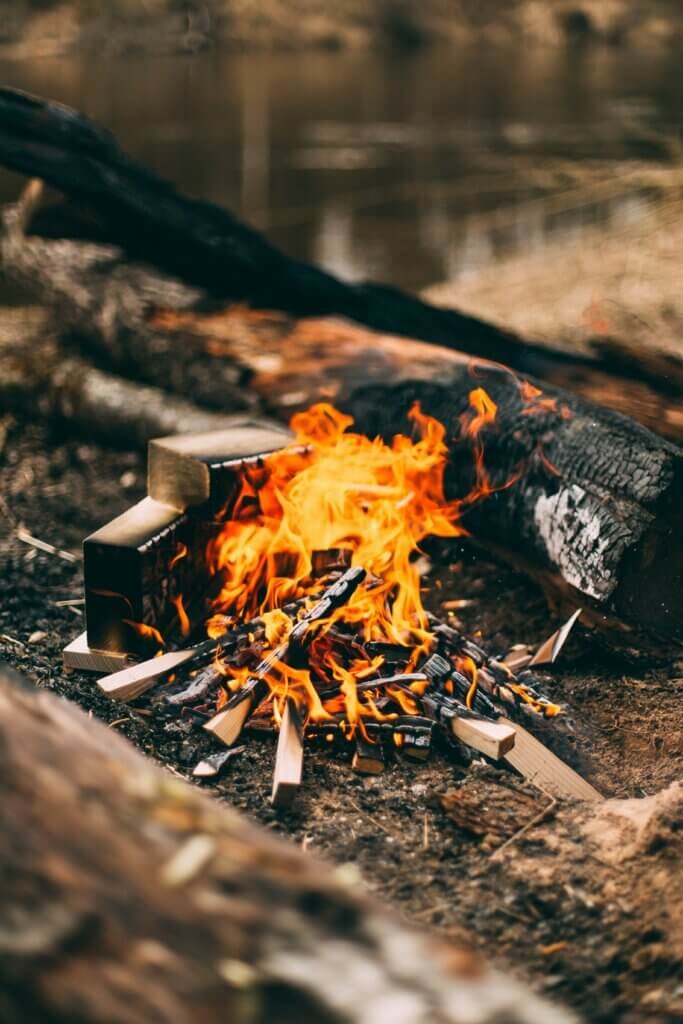
Outdoor Essentials
Outdoor Folding Chairs
Having comfortable seating options for outdoor relaxation is a must. Pack foldable chairs that are lightweight, compact, and easy to set up. This way, you can comfortably enjoy the beauty of nature while sitting around the campfire or admiring a breathtaking view.
Picnic Tablecloth
If your campsite includes a picnic table, a tablecloth can add a touch of homeliness and make meal times more enjoyable. It also helps protect the table’s surface and can be easily cleaned or replaced if needed.
Portable Grill or Camp Stove
Cooking meals over an open flame is one of the joys of camping. Bring a portable grill or camp stove to expand your culinary options and enjoy delicious grilled meals even in remote locations.
Charcoal or Propane
If you’re using a portable grill or camp stove, don’t forget to bring the necessary fuel. Pack charcoal briquettes or propane canisters, depending on the type of grill or stove you have. Having ample fuel ensures you can cook your meals without any interruptions.
Firewood and Fire Starters
If you plan to have campfires during your camping trip, bring firewood and fire starters. Check the regulations and guidelines of your campsite to ensure you comply with any restrictions or requirements regarding the use and sourcing of firewood.
Grilling Utensils
To make the most of your outdoor cooking experience, pack a set of grilling utensils. This typically includes tongs, a spatula, and a grill brush for easy cleanup. Having the right tools on hand ensures efficient and safe grilling.
Cooler or Ice Chest
Aside from keeping perishable food fresh, a cooler or ice chest can also be used to store beverages and keep them cool throughout your camping trip. Make sure to have a sufficient supply of ice or ice packs to maintain the desired temperature.
Lantern and Flashlight
When camping, it’s essential to have adequate lighting for both safety and convenience. Pack a lantern and flashlights to navigate your way around the campsite, especially during nighttime or in areas with limited lighting.
Insect Repellent
Bugs are an inevitable part of nature, but that doesn’t mean they have to ruin your camping experience. Packing insect repellent will help keep pesky mosquitoes and other insects at bay. Consider using natural and eco-friendly options if they are effective in your camping area.
Sunscreen
Protecting your skin from harmful UV rays is crucial during outdoor activities. Pack sunscreen with a high SPF rating to shield your skin from sunburn and potential long-term damage. Apply it generously and reapply as needed throughout the day.
Bed and Bath
Sheets
For a comfortable night’s sleep, pack suitable sheets for your RV bed. Depending on personal preference, this may include fitted sheets, flat sheets, or sleeping bag liners.
Pillows
Bring along your favorite pillows to ensure a restful sleep. Having familiar and comfortable pillows can make a significant difference in your overall sleeping experience.
Blankets or Sleeping Bags
Depending on the expected weather conditions, pack appropriate blankets or sleeping bags to keep you warm and cozy during the night. Layering blankets allows you to adjust to changes in temperature.
Bath Towels and Washcloths
Don’t forget to pack bath towels for showering and washcloths for personal hygiene. Opt for quick-drying towels to save space and prevent dampness in the RV.
Shower Shoes/Sandals
When using shared campground facilities, it’s essential to protect your feet. Pack a pair of shower shoes or sandals to wear when using communal showers or restrooms. This simple precaution can help prevent the spread of foot infections and provide additional comfort.
Toilet Paper
While most campgrounds provide toilet facilities, it’s wise to bring your own supply of toilet paper. This ensures you’re prepared even if there’s a shortage or unexpected inconvenience.
Hand Sanitizer
Maintaining proper hygiene is crucial during camping trips, especially when access to running water and soap is limited. Pack hand sanitizer and use it frequently to keep your hands clean and free of germs.
Toiletry Bag
Keep your personal care items organized by using a toiletry bag. This convenient accessory allows you to store essentials such as toothbrushes, toothpaste, soap, and shampoo in one easily accessible place.
Soap and Shampoo
Pack your preferred soap and shampoo to maintain cleanliness and refreshment. Opt for biodegradable options to minimize the impact on the environment, especially if you plan to use natural water sources for washing.
Toothbrush and Toothpaste
Don’t forget to pack your toothbrush and toothpaste for your daily oral hygiene routine. These small items make a big difference in maintaining a healthy and fresh smile while camping.
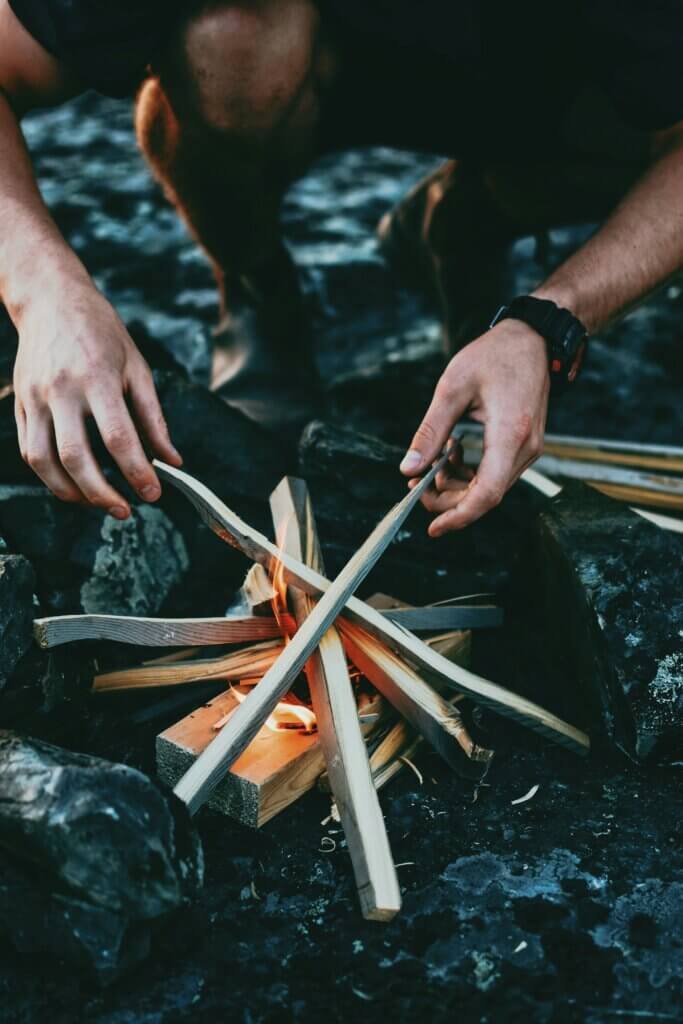
Entertainment and Recreation
Books or Magazines
For moments of relaxation and downtime, bring along books, magazines, or e-readers to indulge in some leisurely reading. A good book is a perfect companion during quiet evenings by the campfire.
Board Games or Playing Cards
Entertainment doesn’t have to be solely digital. Pack board games or a deck of cards to enjoy quality time with your fellow campers. These timeless classics can be enjoyed by all ages and provide endless hours of fun.
Bicycles and Helmets
Exploring your surroundings on two wheels adds a sense of freedom and adventure to your camping experience. If you have the space, pack bicycles and helmets to take advantage of nearby trails or paths.
Fishing Gear
If you enjoy fishing, make sure to pack your fishing gear. Bring fishing rods, hooks, lines, and any other necessary equipment. Check local fishing regulations and obtain the required permits before casting your line.
Sports Equipment (e.g., Frisbee, Soccer Ball)
Engaging in outdoor sports and games is a great way to stay active and have fun as a group. Pack essential sports equipment such as a frisbee, soccer ball, or any other items that suit your preferences and the available space at your campsite.
Hiking Gear
If you plan to go hiking during your camping trip, pack appropriate gear. This may include comfortable hiking boots or shoes, a backpack, a compass, a map, a whistle, and a first aid kit. Plan your hiking routes in advance and familiarize yourself with the area.
Outdoor Toys (e.g., Beach Ball, Water Guns)
To make your camping trip more enjoyable for children (and adults!), bring along some outdoor toys. This could be as simple as a beach ball, water guns, or any other toys that encourage outdoor play and creativity.
Binoculars
Venture into the wilderness and explore the natural wonders with a pair of binoculars. Birdwatching, wildlife spotting, and stargazing are enhanced with the aid of binoculars, allowing you to appreciate the finer details of nature.
Camera
Capture the memorable moments of your camping trip by bringing along a camera. Whether you use a traditional digital camera or rely on your smartphone, having a camera allows you to preserve the beauty of your outdoor adventures.
DVD Player or Streaming Device
For evenings of relaxation and indoor entertainment, consider packing a portable DVD player or streaming device. This allows you to enjoy your favorite movies or shows, especially if your camping destination lacks internet connectivity.
Utilities and Electronics
RV Water Hose
To ensure a steady supply of freshwater during your camping trip, pack a suitable RV water hose. Check the length and compatibility requirements of your RV’s water system to ensure you have the right hose on hand.
Sewer Hose and Connections
Proper waste disposal is essential for a sanitary camping experience. Pack a sewer hose and the necessary connections to ensure you can empty your RV’s waste tanks properly when needed. It’s essential to follow campground regulations and dispose of waste responsibly.
Electrical Adapter
Different campsites may offer different electrical hook-up options. Pack an electrical adapter to accommodate various outlet configurations and ensure you have reliable access to electricity for your RV’s appliances and devices.
Battery Jumper Cables
In case of a dead battery, having battery jumper cables is a lifesaver. These cables allow you to jump-start your RV’s battery using another vehicle’s power, ensuring you can get back on the road or resolve any electrical issues.
Extension Cords
Depending on the layout and electrical access points at your campsite, you may need extension cords to reach your RV’s electrical system. Pack a few different lengths to ensure you have the flexibility you need.
Cell Phone Charger
Keeping your cell phone charged is crucial, especially in case of emergencies or when you need to stay connected. Bring a compatible charger and make sure to charge your phone whenever possible.
Portable Charger
In addition to a cell phone charger, a portable charger is a valuable accessory to have during camping trips. It allows you to charge your devices on the go, even when you’re away from electrical outlets.
Laptop or Tablet
If you plan to work remotely, stay connected, or enjoy your favorite digital content during your camping trip, pack your laptop or tablet. These devices can provide entertainment, keep you connected, or help with any remote work responsibilities.
Portable Wi-Fi Hotspot
While camping is often an opportunity to disconnect from the digital world, having a portable Wi-Fi hotspot can be useful for emergencies or when you need reliable internet access. Research available options and choose a hotspot device that best suits your needs.
TV and Antenna
If you’re craving some television entertainment while camping, consider bringing a small TV and an antenna. This allows you to tune into local stations and enjoy a little downtime with your favorite shows.
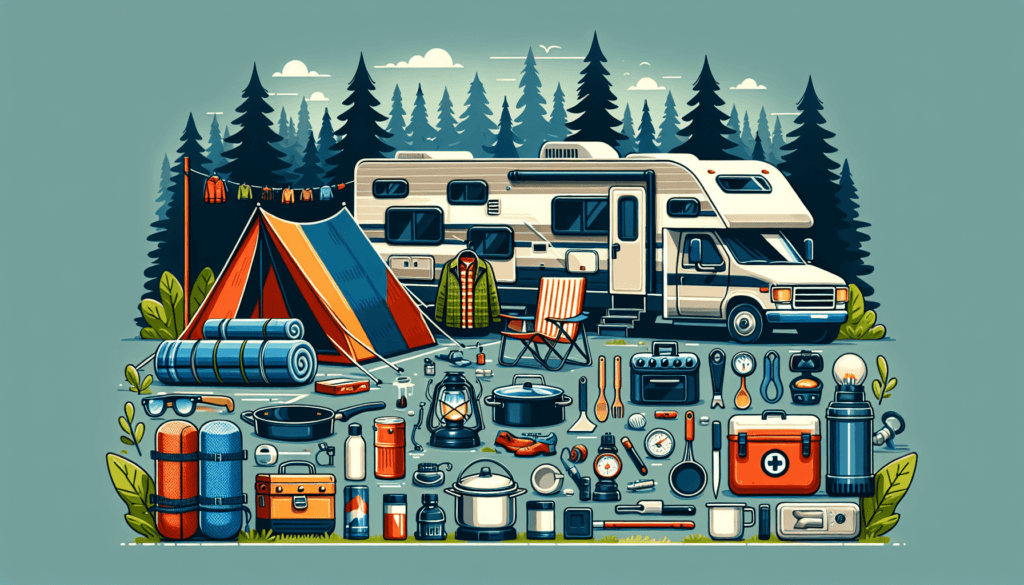
Safety and Security
Fire Extinguisher
Safety should always be a priority while camping, and having a fire extinguisher on hand is crucial. Make sure the fire extinguisher is easily accessible and in proper working condition.
Carbon Monoxide Detector
RVs are equipped with various appliances that can produce carbon monoxide, such as stoves, ovens, and heaters. Ensure your safety by packing and installing a carbon monoxide detector in your RV. This device will alert you if there are high levels of carbon monoxide present.
Smoke Alarm
To further enhance safety, pack a smoke alarm that is designed for RV use. Test it to ensure it’s functioning correctly and replace the batteries if needed. It’s always better to err on the side of caution when it comes to fire safety.
Security Lock for RV Door
Protecting your belongings and ensuring your peace of mind is essential while camping. Consider investing in a reliable security lock for your RV’s door. This can deter potential intruders and provide an added layer of security.
Portable Safe for Valuables
If you’re carrying any valuable items with you, it’s a good idea to pack a portable safe. This allows you to keep your valuables secure and gives you peace of mind when leaving the RV unattended.
Window Screens
Keep pesky bugs out of your RV by installing window screens. These screens allow fresh air to circulate while keeping insects and other unwanted critters at bay.
Emergency Contact List
Always be prepared for emergencies by having a printed emergency contact list readily available. Include important phone numbers for medical services, roadside assistance, campground management, and loved ones who need to be contacted in case of an emergency.
Insurance Information
In the unfortunate event of an accident or incident, it’s crucial to have your insurance information easily accessible. Keep a copy of your RV insurance policy and any necessary contact information for insurance claims.
Backup Batteries for Devices
Having extra batteries on hand for your devices can be a lifesaver, especially if you’re in an area with limited access to electrical outlets. Pack backup batteries for essential devices such as flashlights, cameras, or remote controls.
Weather Radio
Staying informed about weather conditions is vital, particularly when you’re camping in remote areas. Pack a weather radio that can receive emergency alerts and updates. This device will help you stay prepared and make informed decisions during severe weather events.
Miscellaneous
Trash Bags
In addition to the previously mentioned trash bags, having a few extra on hand is always a good idea. You never know when you may need more storage for your garbage or when unexpected situations arise.
Ziplock Bags
Ziplock bags are versatile companions during camping trips. They can be used to store leftovers, provide a waterproofing solution for electronics or documents, or even keep small items organized and easily accessible.
Zip Ties and Duct Tape
Zip ties and duct tape are must-have items for any camping trip. These versatile tools can be used for quick fixes, securing equipment, or improvising solutions for unexpected situations.
Bungee Cords
Bungee cords can be useful for securing items to your RV or keeping things organized. They provide a flexible and adjustable way to secure loose items, such as camping chairs, mats, or bicycles.
Outdoor Mat or Rug
Keep the inside of your RV clean by packing an outdoor mat or rug. Placing it outside your RV’s entrance can help prevent dirt, mud, and debris from entering your living space.
Extra Batteries
When packing your electronic devices, always bring extra batteries. It’s better to have more than you need, especially during extended camping trips when battery replacements may be hard to find.
Pocket Knife
A pocket knife is an essential tool for any camper. It can be used for various tasks such as cutting rope, opening packages, or preparing food. Make sure to keep it in a safe and easily accessible place.
Basic Cleaning Supplies
Maintaining cleanliness and hygiene is important, even while camping. Pack basic cleaning supplies such as multi-purpose cleaners, disinfecting wipes, and paper towels to ensure a clean living space.
Small Backpack or Daypack
A small backpack or daypack is convenient for short hikes, day trips, or carrying essential items while exploring your surroundings. Choose a lightweight and compact design that can be easily folded and stored when not in use.
Cash or Credit Cards
While many camping facilities and attractions accept credit cards, it’s always a good idea to carry some cash as a backup. Some remote areas may not have access to electronic payment systems, so having cash on hand can be useful for emergencies or unexpected situations.
By following this comprehensive checklist, you can be well-prepared for your RV camping trip. Remember to tailor the list to your specific needs and destination, and make sure to check any additional requirements or regulations for the campgrounds you plan to visit. Happy camping!
